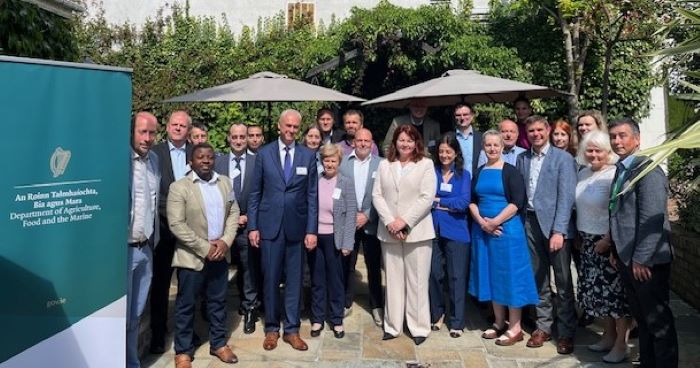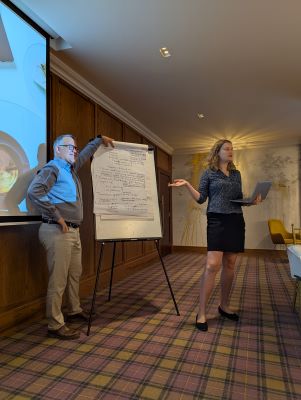
63rd Meeting of the Working Party on Phytosanitary Regulations
Maynooth (IE), 2025-06-17/20
The 63rd meeting of the Working Party on Phytosanitary Regulations took place in Maynooth (IE), on 2025-06-17/20. The meeting was hosted by Department of Agriculture, Food and the Marine (Ireland). The meeting was attended by 21 participants from 18 EPPO member countries, as well as by a representative of the European Commission. The Working Party on Phytosanitary Regulations oversees the technical work of many EPPO Panels related to plant health. A summary of the different Panel meetings and Workshops which took place since the last meeting was presented to the Working Party (short summaries of these meetings are posted on the EPPO website). The Working Party discussed new and revised EPPO Standards, the EPPO work programme for 2026, and made several recommendations that will be presented to the EPPO Council.
A technical visit was arranged to Phoenix Park (Dublin) where participants learnt about surveillance work and scientific research conducted on plant pests.
EPPO expresses its thanks to the Department of Agriculture, Food and the Marine (Ireland) for hosting the meeting. EPPO also thanks the Office of Public Works and the Agricultural Food Development Authority for the practical demonstrations and information during the technical visit.

Participants at the 63rd Working Party on Phytosanitary Regulations
New and revised EPPO recommendations and Standards
The Working Party recommended that 4 new pests (including an invasive alien plant) should be added to EPPO Lists of pests recommended for regulation as quarantine pests: Xylotrechus pyrrhoderus, Resseliella citrifrugis to be added to the EPPO A1 List of pests absent from the EPPO region; Ceratocystis ficicola and Euphorbia davidii (plant) to be added to the EPPO A2 List of pests present in the region. For each pest, phytosanitary measures are recommended in a Pest Risk Analysis (PRA) document which will be made available via the EPPO PRA platform.
The Working Party agreed with the recommendation to transfer ‘Candidatus Phytoplasma ulmi’ and Ripersiella hibisci from the EPPO A1 List to the EPPO A2 List.
Six new and revised Standards were recommended to the Council for adoption:
- Phytosanitary Procedures (series PM 3)
- PM 3/NEW General guidelines for the export certification process for plants, plant products or other regulated articles
- PM 3/70 (2) Compliance procedures for consignments of potato tubers at export and import (revision)
- Diagnostic protocols for regulated pests (series PM 7)
-
PM 7/122 (2) Guidelines for the organization of interlaboratory comparisons by plant pest diagnostic laboratories (revision)
- PM 7/98 (5) Specific requirements for laboratories preparing accreditation for a plant pest diagnostic activity (revision)
- PM 7/84 (3) Basic requirements for quality management in plant pest diagnostic laboratories (revision)
-
- National regulatory control systems (series PM 9)
-
PM 9/NEW Amaranthus palmeri and A. tuberculatus
-
The Working Party also noted the adoption of the following Diagnostic Protocols (series PM 7) approved since its last meeting according to the specific fast-track procedure:
-
PM 7/125 ELISA tests for viruses (revision)
-
PM 7/011 Frankliniella occidentalis (revision)
- PM 7/ NEW Rhagoletis pomonella
- PM 7/026 Phytophthora cinnamomi (revision)
- PM 7/045 Cryphonectria parasitica (revision)
- PM 7/NEW Stagonosporopsis chrysanthemi
- PM 7/158 Meloidogyne graminicola (revision)
The Working Party recommended the following Standard to be withdrawn:
- PM 3/29 General export inspection procedures for glasshouse and nursery enterprises
Diagnostics
The EPPO Secretariat presented an update on the activities of the diagnostic Panels since the last meeting of the Working Party, and the Workshop for the Heads of plant pest diagnostic laboratories held in Estonia. The Working Party was informed about ongoing work to divide PM 7/129 DNA Barcoding as an identification tool for a number of regulated pests, into one general Standard and individual Standards relating to distinct taxa. The Working Party was also updated on the diagnostic databases EPPO database on diagnostic expertise and EPPO-Q-bank. The Working Party approved the revised terms of reference of EPPO diagnostic Panels. The Working Party agreed on the development of new or revised diagnostic protocols for 2026.
PRA activities
The Working Party agreed that an Expert Working Groups (EWG) for PRA should be organized for one invasive alien plant, Senecio angulatus (Asteraceae). In addition, PRA EWGs will be organised for Clavibacter nebraskensis (Micrococcales) and Austropuccinia psidii (Pucciniales). If the workload allows a PRA EWG will be organised for Anoplophora horsfieldii (Coleoptera: Cerambycidae). The pests Litylenchus crenatae mccannii (Rhabditida), Euzophera semifuneralis (Lepidoptera: Pyralidae), Phlyctinus callosus (Coleoptera: Curculionidae), Xylotrechus chinensis (Coleoptera: Cerambycidae) and Monema flavescens (Lepidoptera: Limacodidae), were identified as priorities for PRA reports based on national or EFSA PRAs and other documents.
A webinar on improving mapping and modelling in EPPO PRAs will be organised with core-members, experts and Panel members.
Phytosanitary measures
The Working Party approved amendments to the phytosanitary measures for several pests recommended for regulation, including Euwallacea fornicatus sensu lato (Coleoptera: Scolytinae) & Fusarium euwallaceae, Megaplatypus mutatus (Coleoptera: Platypodinae), Oemona hirta (Coleoptera: Cerambycidae) and Thaumatotibia leucotreta (Lepidoptera: Tortricidae). The Working Party discussed and agreed on a new process for delisting pests from the EPPO A1 or A2 Lists. This included the criteria for delisting a pest and the timetable and procedure that will be followed. The process will be tested with three pilot pests Cacoecimorpha pronubana, ‘Candidatus Phytoplasma ulmi’ and strawberry latent C virus. The Working Party also agreed on a proposal to update and develop further the pathway tool in EPPO Global Database. The Working Party agreed that a pilot project can be conducted to use IT tools to help generate the appendix on symptoms and sampling for identification of quarantine pests in the EPPO PM 3 Standards. This project will generate the contents of the appendix from data in EPPO Global Database.
Biological control agents
The Working Party agreed with the Panel proposal to add three biological control agents to the EPPO Standard PM 6/3 Biological control agents safely used in the EPPO region: Aeolothrips intermedius and Nephus includens to Appendix 1- Commercially or officially used biological control agents, and Torymus sinensis to Appendix 2 – Classical biological control agents successfully established in the EPPO region. The Working Party was updated on the development of a platform to share information on biological control agents and ongoing discussions on how to promote the use of Sterile Insect Techniques in the work of the Joint EPPO/IOBC Panel on Biological Control Agents.
Information services
An update was given on the ongoing work of the information services including EPPO Global Database, the EPPO platform on communication material, the EPPO Platform on PRAs, and EPPO Codes. The Working Party was informed about the success of the EPPO webinar on Communication organised with the Panel on Plant Protection Information. Priorities for the development of new and revised datasheets on plant pests (including invasive plants) were presented to the Working Party. The Working Party was informed of the additions made to the Alert List since the last meeting. The Alert List draws the attention of EPPO member countries to pests possibly presenting a risk to plants in the EPPO region, in order to achieve early warning.
Plant Health Links in the EPPO Region
Plant health links and collaborations with other regional plant protection organisations (RPPOs), international organisations, the EU and EFSA were discussed. It was noted there is an open call for the EPPO Jens-Georg Unger Plant Health Fellowship for international co-operation in plant health. The Working Party was informed about the recent EPPO/NEPPO contingency exercise on Xylella fastidiosa held in Tunisia in May 2025. The Working Party was informed about work being conducted at the IPPC level, including the regional workshop and technical consultations among RPPOs. Updates were presented on Plant Health matters for the European Commission and the Eurasian Economic Commission.
Projects
The Working Party was updated on Euphresco’s activities, in particular the project EUPHRESCO III ´Strengthening phytosanitary research programming and collaboration: from European to global phytosanitary research coordination´ (2023-2026). In addition, two scientific presentations were given on Euphresco success stories. The EPPO Secretariat provided an update on the RNQP Project part 2 which will assess the RNQP status of pests mainly from the EU fruit marketing Directives. Additionally, the Working Party was informed of the activities being conducted as part of the FORSAID project which aims to harness innovative technologies to ensure plant health in European forests.
Other business
The Working Partly carried out a brainstorming exercise where practical solutions and new approaches to raise awareness and increase engagement among all 52 EPPO Member Countries were suggested. The EPPO Secretariat will take the ideas gather from this exercise and assess the feasibility of integrating these elements into our procedures to increase engagement and visibility of EPPO’s work.

Brainstorming session at Working Party (2025-06-20)
The 64th meeting of the Working Party on Phytosanitary Regulations will be held on 2026-06-23/26 (location still to be confirmed).
